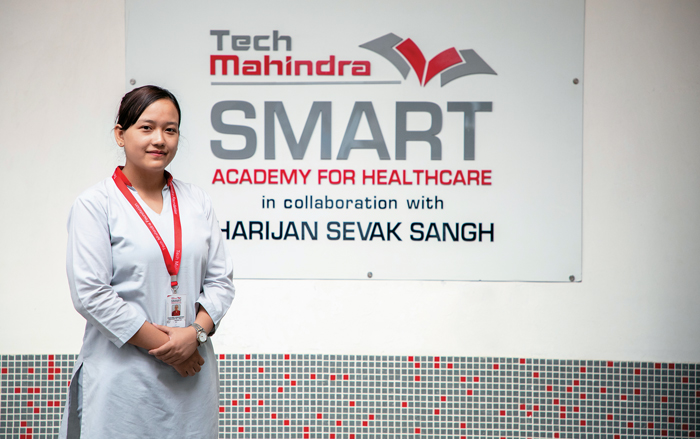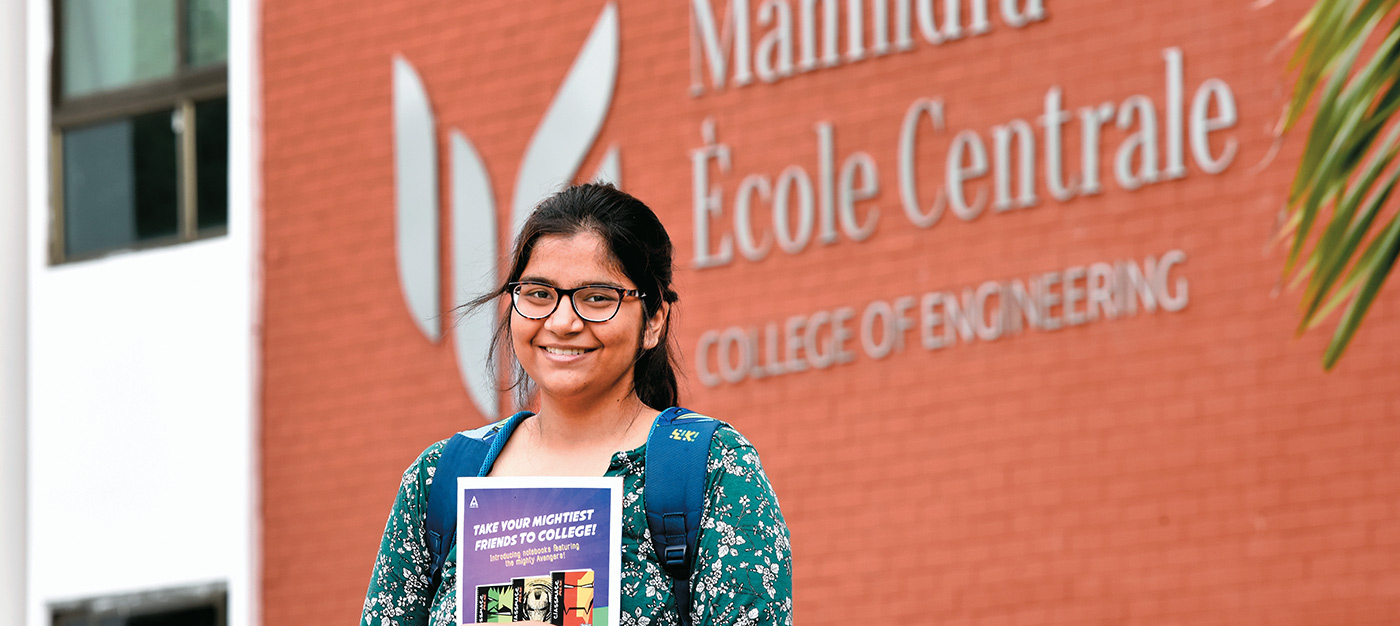
EDUCATE, EMPLOY AND EMPOWER THE YOUTH FOR A BETTER INDIA
Tech Mahindra Foundation
Tech Mahindra Ltd, with revenue of around $5
billion, is an information technology
company in the $21 billion Mahindra Group. Tech Mahindra is an industry leader
in the
IT and digital transformation space, focusing on new areas such as Customer
Experience
Management, Internet of Things (IoT), Software Transformation and Networks of
the future.
The company and its employees live a philosophy of “Connected World and
Connected
Experiences.”
This philosophy is practiced with the same passion and spirit
at Tech Mahindra Foundation
(TMF), which is the Corporate Social Responsibility (CSR) arm of Tech Mahindra
Ltd. Set up in
2007, it has a vision of ‘Empowering through Education’. The Foundation seeks to
bring about
sustainable impact and social transformation in the quality of the lives of
underprivileged youth
through their key focus areas - Education, Employability, Disability and
Corporate Volunteering.
“As a CSR arm of Tech Mahindra, we are constantly working to pay back to the
society through
our programmes in skilling, teacher education and working with Persons with
Disabilities.
We aim to create a skilled workforce for our economy and uplift the life of
youth. On the
education front, the Foundation works with the Government and state municipal
corporations
to help schools bring about all-round development of children and teacher
capacity building
initiatives,” says Rakesh Soni, CEO, Tech Mahindra Foundation.
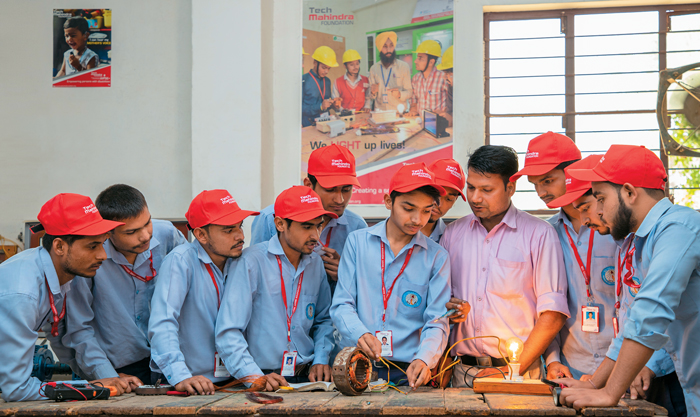
The Ingraham ITI in Ghaziabad, UP is the SMART project implementer. It offers two courses with support of Tech- Mahindra--Computer Numerically Controlled(CNC) course (4 months) and Electrical (6 months).
The Foundation has established itself as a CSR player within the Mahindra Group as well as a social organisation at the national level. Vineet Nayyar, the Founder of the Foundation enshrined its purpose through the phrase "Empowerment through Education”. “An unrelenting focus on the beneficiaries is the hallmark of what we do at Tech Mahindra Foundation. Having trained 75000+ youth since 2012 with a 75%+ placement rate, the Skills-for-Market Training (SMART) Programme continues to march ahead,” says Chetan Kapoor, Chief Operating Officer, Tech Mahindra Foundation.
TMF has kept its focus on reaching out to the beneficiaries in a way that, all efforts benefit the target group. “We have a robust Management Information System (MIS) which enables us in making data-driven decisions. The MIS is developed for all projects and tracks the progress of our beneficiaries and captures their significant milestones in their journey, with us. Besides, we try to focus on the sections of the society where opportunities are few, like those in North- East and Jammu & Kashmir or on families of cancer patients and Anganwadi workers. The Tech Mahindra SMART Academies are built with a CSR agenda and will be self-sustainable in the long run”, says Sajid Ali, Head-Direct Implementation Programmes.
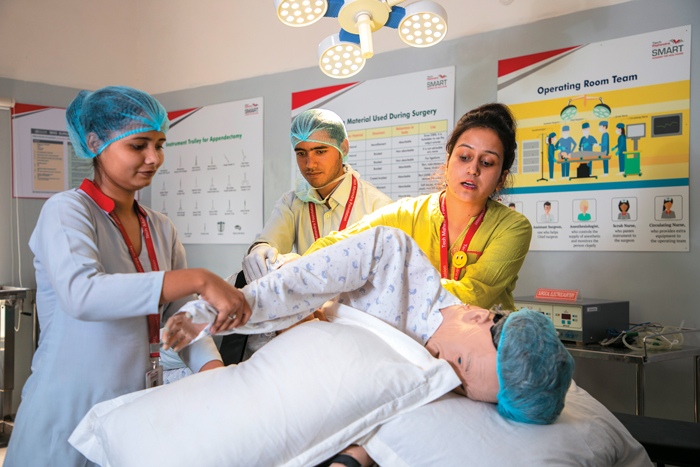
The SMART Academy for Healthcare in collaboration with Harijan Sevak Sangh has been creating world class paramedical professionals. There is a growing need of paramedic professionals in India. Many hospitals across the country and corporate are in need of them.
The Foundation’s work in primary education focuses upon three thematic areas: school improvement, teacher empowerment and learning enrichment. In the domain of education, SHIKSHAANTAR is the Foundation’s training programme for teachers. The Foundation runs two premier in-service teacher capacity building institutes called in-Service Teacher Education Institutes (ITEIs) with North Delhi Municipal Corporation and East Delhi Municipal Corporation. The Foundation also works in approximately 40 government schools through its ARISE (All Round Improvement in School Education) programme with the objective of holistic development of children in these schools. Together, this year, the Foundation is supporting about 50 schools across India and is working with 42 partners to turn them into models of excellence.
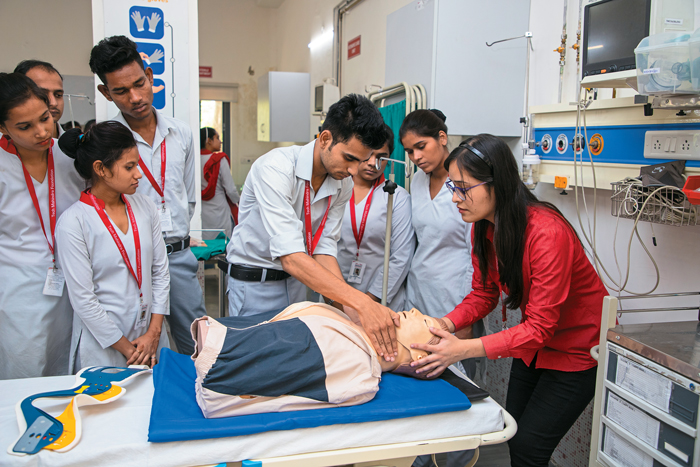
The students learn the basics of paramedics through 11 courses offered by the TMF Healthcare Academy.
SMART (Skills for Market Training) is Tech Mahindra Foundation’s flagship employability programme, with 103 centres providing skill development in 11 cities. Over the years, SMART has successfully trained approximately seventy-five thousand young men and women, with a placement success rate of over 75%. It's robust processes, stringent monitoring system and industry-led approach, has created a model for scaling up skill development while maintaining high training standards. “We realized the need for technical education and started SMART Technical, one example being the Ingraham. It has benefitted the youth as well as industry,” says Chetan Kapoor.
To meet the
dynamic nature of employability, TMF launched a special course
for building maintenance in Bengaluru and e-Publishing in
Chennai, to meet the increasing demand of e-books.
In addition, the
Foundation runs three Tech Mahindra
SMART Academies for Healthcare and one Digital Media
under employability. The academies are state-of-the-art centres
imparting high-quality training, with a blend of classroom,
practicals and on-the-job training. The academies closely engage
with the industry for constant curriculum upgradation and
placements. Over the years, 1500+ youth have been enrolled
across the academies to become skilled working professionals.
The Tech Mahindra SMART Academies for Healthcare are now
offering two year Diploma courses which are well recognized by
the healthcare industry players.
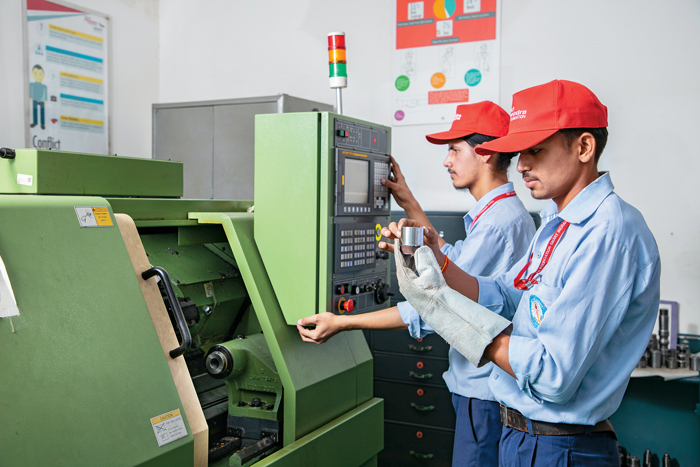
The CNC machine donated by TMF is a major attraction for students at ITI Ingraham, as no other institute has been able to provide it in the nearby locality.
Disability is the third major area of intervention for Tech Mahindra Foundation. The Foundation works towards ensuring that Persons with Disabilities have the opportunity for a better future and dignified lives. This is done through two programmes: ARISE+ (All Round Improvement in Special Education) and SMART+ (Skills-for Market Training for Persons with Disabilities). ARISE+ is a special programme which encompasses initiatives for children with disabilities such as visual impairment, hearing impairment, and intellectual disability.The SMART+ programme focuses on providing employable market-related entrepreneurial skills, and opportunities to youth with disabilities.
Specially designed curriculum and well-equipped classrooms allow young people with disabilities to acquire different foundation skills such as Basic IT and Computers, Spoken English and Workplace Readiness. The Foundation mandates that at least 10% of all its beneficiaries are Persons with Disabilities.
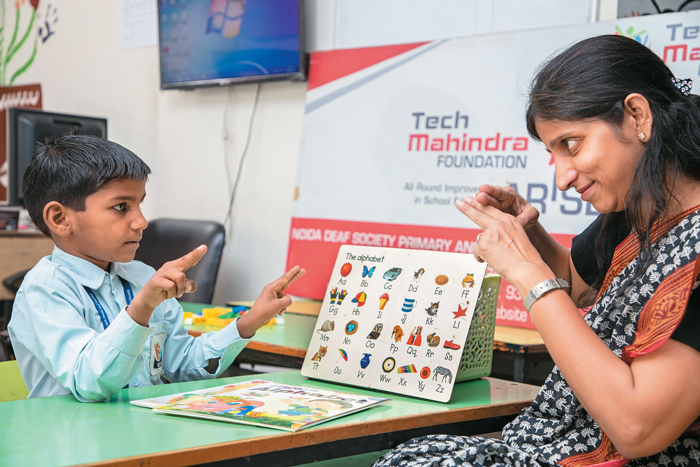
The TMF association with the Noida Deaf Society has helped many children from underprivileged communities to develop confidence, to be part of the society that wants to be economically independent and contributing to the country’s GDP.
Corporate Volunteering lies at the heart of Tech Mahindra Foundation's ethos. Employees volunteer in the various programmes and contribute to driving positive social change while simultaneously enhancing their own capacities for empathy and compassion. Every year, thousands of employees participate in several activities that are planned across all the TMF locations such as blood donation, tree plantation, Swachhata Hi Seva, bicycle rallies, paint the wall, card making, conducting training sessions and more.
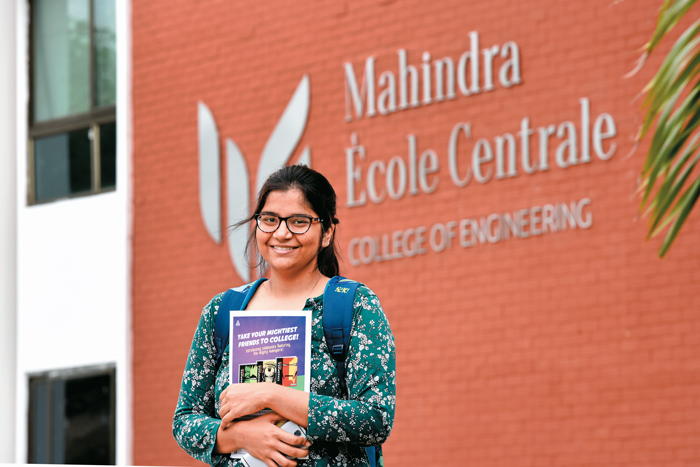
“The curriculum of École Centrale is extremely good. The idea of collocating the MEC in our 125 acre Hyderabad campus was to allow easy interface between students and the industry, as about 7000 of our associates are working in it,points Vineet Nayyar, Founder, Mahindra Ecole Centrale."
Mahindra Ecole Centrale was established in August 2014 – through a collaborative venture between Mahindra Educational Institutions (MEI – a not-for-profit, 100% subsidiary of Tech Mahindra), École Centrale of Paris, France (now known as Centrale Supelec) and the JNTU Hyderabad to offer undergraduate engineering programmes in Computer Science Engineering, Mechanical Engineering, Electrical & Electronics Engineering, and Civil Engineering located at the Tech Mahindra Technology Centre campus in Hyderabad.“The curriculum of École Centrale is extremely good. The idea of collocating the MEC in our 125 acre Hyderabad campus was to allow an easy interface between students and the industry, as about 7000 of our associates are working at the facility,” points Vineet Nayyar, Founder, Mahindra École Centrale.
It has a
strong student to faculty ratio of 15:1. The result of this ratio is
reflected in a huge demand from the industry for MEC engineers.
For the batch of 2019, the employers from all sectors of the
industry offered 150+ positions with an overall average salary of
Rs. 7 Lakh per annum. Four of the students grabbed the offer of Rs. 30
Lakh per annum, being the highest of the packages.
The companies that
conducted recruitment drives at MEC include
big brand names like Capgemini, Cognizant, ADP, Raheja, Mahindra
& Mahindra, Tech Mahindra and many more. The placements
became truly international with the offers from brands like Tecnos,
Line Corp and Oisix from Japan.
In their 2nd year and 3rd year, the students
of MEC are able to take
summer internships overseas in University of Florida, Gainesville; UT
Austin, Georgia Tech, Atlanta; University of Nebraska at Omaha; IIT
Chicago; University of Connecticut; London School of Economics and
in corporate organisations like Mahindra & Mahindra, Tata Steels,
Tata Boeing, Tata Consultancy Services, T-Hub, Intel & Deloitte and
Navaratna companies like BHEL, ONGC and HPCL.
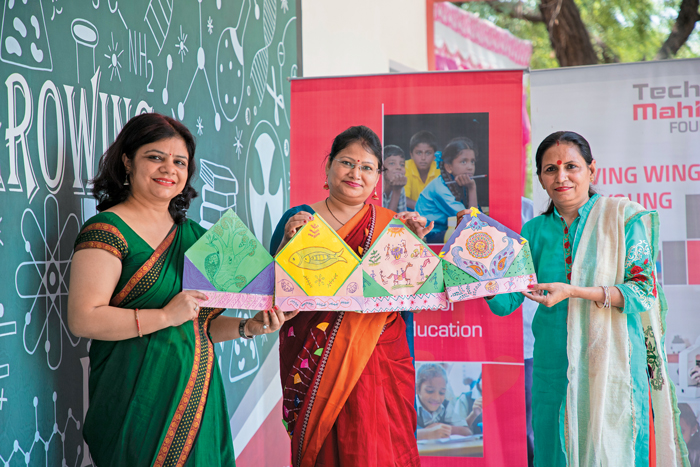
The primary teachers of the government schools in the two municipalities (North Delhi Municipal Corporation and East Delhi Municipal Corporation) have immensely benefitted from the activities planned by the associates of the Foundation at the In-Service Teacher Education Institute (ITEI, teacher training institute).
The primary teachers of the government schools in the two municipalities (North Delhi Municipal Corporation and East Delhi Municipal Corporation) have immensely benefitted from the activities planned by the associates of the Foundation at the In-Service Teacher Education Institute (ITEI, teacher training institute). The activities have not only improved the attention span of students in the class, but also their participation and attendance. The ITEI offers activity-based teaching for teachers. The participation is very high and the demand is increasing for TMF to take up more such training institutes. TMF not just provides all the financial support required but also runs these projects as directly implemented programs. In 2019, TMF has launched English-Winglish, a teachers training programme to help government school teachers to improve their teaching capacity in English.
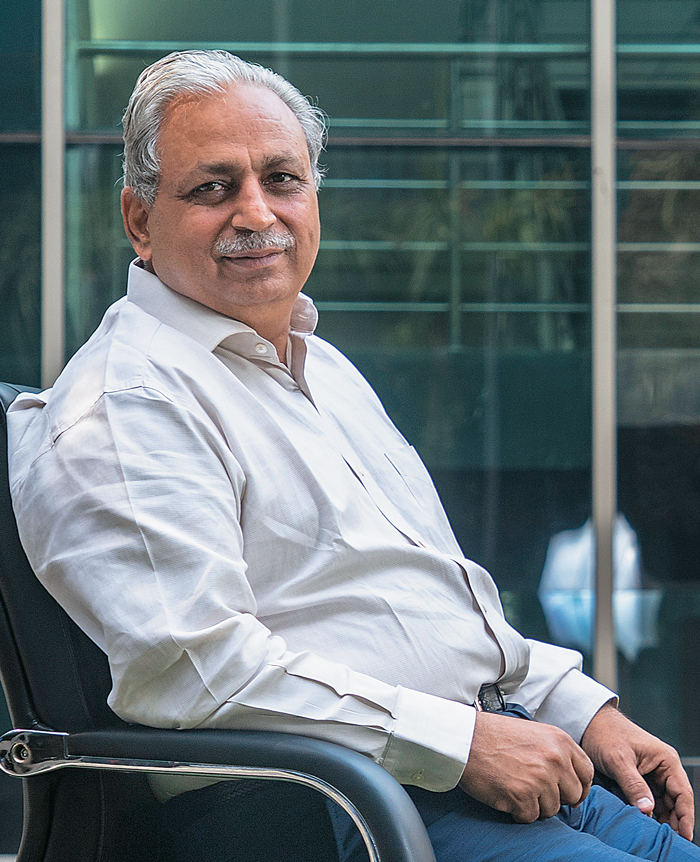
C P Gurnani
Managing Director & Chief Executive Officer, Tech Mahindra Limited
How do you see volunteerism growing in TMF, in India for CSR activities?
Every employee of Tech Mahindra is immensely proud of four things: One, the company’s encouragement towards Individual Social Responsibility (ISR). This is because charity is a very personal subject. Our effort has been to channelize that force by providing a framework and guidance. We have been doing CSR activities for more than three decades and did not wait for the 2% legislation. Two, they are proud of what we are doing to enable the cause of education including the setting up of the engineering college with École Centrale, the SMART Healthcare Academies, the SMART centres and ‘Enablement programme’ for teachers, ARISE and ARISE+ initiatives.
Third, we believe that it is our responsibility to save this planet for the next generation. We do a lot of work internally to be a more sustainable organisation and we do this with a sense of responsibility to become responsible citizens. Signing cheques is easy, creating a building is easy, anyone can do it for CSR, but the difference is in involvement. Fourth, is to continue this spirit. We have an internal programme called ‘Josh’. With an average employee age of 27, Josh team is young and full of passion. I need to give them a channel; it could be trekking one day, photography and social service another day. This feeds into the first three. In our company people realize that we are lucky, we are fortunate that we can give back to society. The world has been kind to us.
How can we bring in more for CSR work from corporate, beyond 2%?
I always believed in the power of purpose, goal and outcome. All three are not synonymous. To understand the purpose, we need some handholding. Currently, there is a vacuum for such handholding. Goal—I think in implementing CSR, the industry views 2 % as a benchmark but does not have a goal for it. The outcome will not happen unless you are participating in it or feeling it. My wife and I have a goal, in our finite life, we want to make lives of 250 children better through our NGO Titliyan. The outcome, today everyone who comes to our home also wants to visit Titliyan, they want to donate on their birthday after they see pictures of children (from underprivileged families) becoming what they want. My only request to anyone, who thinks CSR as just a government objective is please don’t look at it that way.
Where do you see the future of CSR beneficiaries contributing to the economy?
There is much more beyond the 2% and we can do a lot more. As Bill Gates at the prime of his career set up the Bill Gates Foundation or as President Clinton set up The Clinton Foundation. Both have dedicated their lives for a cause. In India, I feel, we do not have any parallel examples of that kind. The leadership in India has to do a lot more. Many of us who are considered industry captains and are more privileged than the others, we need to set an example. I am glad some of us have started to do it like Azim Premji. I was once told 0-25 years is about learning, 25-50 years is about earning and 50 to rest of your life is returning. That spirit has to come back, which is an age-old tradition. There are a few examples of chairs and scholarship, but we need universities that can proudly say that they have a billion dollar grant from their ex-students.
Sameer joined the centre run by Noida Deaf Society in 2011. He was seven year old when he joined the teaching centre managed by Noida Deaf Society. He is good at studies and wants to be a computer operator. He does not understand TMF, but he knows that it helps the society and supports their efforts. Sameer was very aggressive as a child but the academy has helped him channelize that anger to go for computer related education. The society has also taken initiative to teach the parents sign language for better communication with their children who cannot hear.
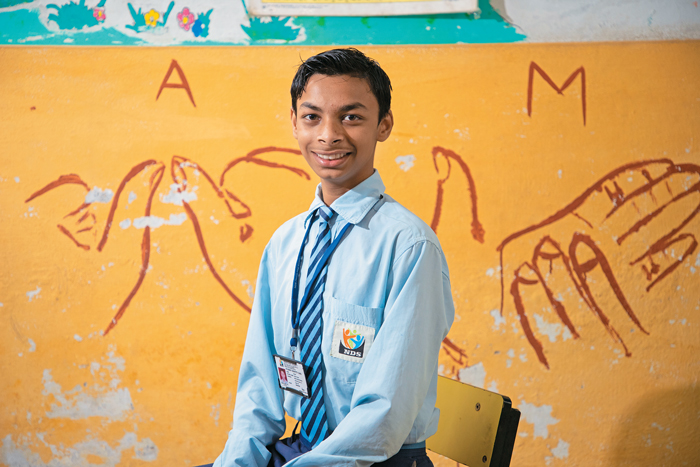
Malti Lenka (Manipur) I came to know about this course through an NGO. In Manipur, there is shortage of medical technicians (paramedics). After finishing the course, I wish to gain experience for one year here, then go back and work in Manipur. This course has helped me acquire a skill and now I want to pursue my studies further. She says the course meets the demand of healthcare sector across the country.
